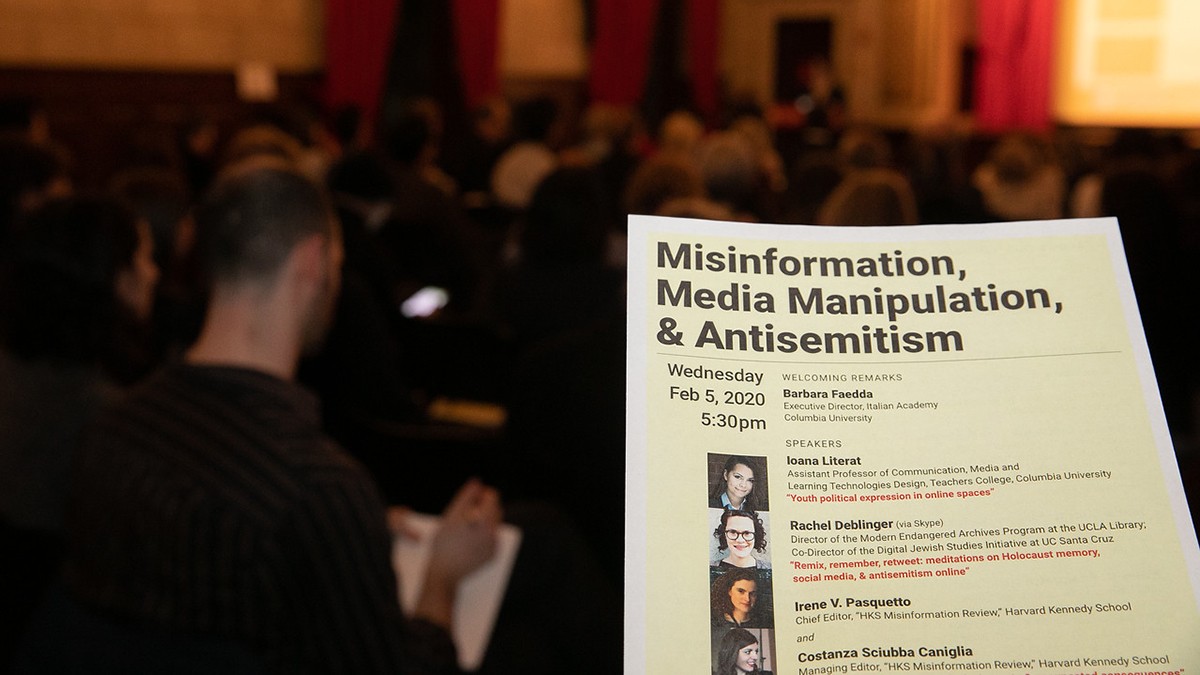On February 5, 2020, researchers from a range of disciplines spoke to a lively, full-capacity crowd at the Italian Academy for this year’s Holocaust Remembrance Day symposium. The 2020 topic was online extremism, particularly the negation of historical facts and the manipulation of social media to pursue neo-Nazi and neo-Fascist ideas.
The Sensational and the Divisive
Alex Abdo, litigation director at the Knight First Amendment Institute, noted that social media companies’ “algorithmic amplification and suppression of speech appears to be deepening our political divisions, fueling hatred and proliferating antisocial ideologies. The evidence of this is still incomplete, however, as are the explanations of precisely how and why it may be occurring—and what changes the companies or Congress could make to combat it. As misinformation and hate flourish online, the terrain and the rules that apply to it are, at best, unfamiliar and, at worst, tilted in favor of the sensational and the divisive.”
A Facebook Case
Costanza Sciubba Caniglia and Irene V. Pasquetto, both from the new Misinformation Review at the Harvard Kennedy School, took up the idea of combating online hate by “de-platforming” neo-Nazis. They cited an Italian case with unintended consequences: A violent, dangerous organization, the extreme-right, racist and antisemitic CasaPound lost its Facebook access in autumn 2019, but a civil court in Rome immediately judged that Facebook had violated the group’s free speech. Facebook reactivated CasaPound’s account and paid its legal costs.
Asked to Remember, Not to Intervene
Rachel Deblinger, who works at UCLA and is co-director of the Digital Jewish Studies Initiative at University of California Santa Cruz, joined in (via Zoom) and discussed using social media to bring Holocaust memories to life today, focusing on two recent accounts: Twitter’s @Stl_Manifest (recalling the Nazi victims who were turned away by America in 1939) and Instagram’s @eva.stories. Deblinger said that @eva.stories succeeds by spurring meaningful interaction with the Holocaust, but it also fails by not serving as a platform for documentation of today's global atrocities, as does Instagram. "This could prompt action now," she noted. “We as viewers are asked to remember, not to act. We are asked to share compassion and grief, but we are not asked to intervene."
Political Awareness Grows Online, Not at the Dinner Table
Finally, Ioana Literat, a professor of communications, media and technology at Teachers College, showed examples of online platforms where youthful political expression blossoms unexpectedly. “We don’t tend to think of young people's favorite online hangouts—social media, lip-synching apps, video games, fandom communities, even Scratch, a programming platform for children from the MIT Media Lab—as meaningful political spaces,” she said. “But these are young people’s pathways into politics, much more than, as we prefer to believe, the civics classroom or the family dinner table.”

